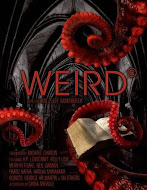Tomorrow is the beginning of the end [of my social life for at least a month]. November will be here and NaNo will be unforgiving. I admit that I have been an intensely bad boy for not doing necessary prep work. I know [vaguely] where my story will go. I've got me a beginning and I've got me an end, but the In-between is very hazy.
I know my cast on codename basis, which is a bit bad. I know of their pasts, but I have yet to flesh out their parents with their super powers, names, codenames and appearances. Thankfully, this is an introduction into the world and the characters, so I don't need to stuff that much into this one novel.
I also have a title:
'V is for Voltage'
Voltage is the codename of the most corrupt villains of the Syndicate. The one who was a villain before seeking vendetta in the first place. The idea is that unlike the Enforcers, who go around calling each other with their full codenames, the Syndicate will use the letters of theirs. Like a weird mix between 'Reservoir Dogs' and 'V is for Vendetta'.
Anyway, my deal schedule would be:
Monday: 3,000
Tuesday: 1,000
Wednesday: 1,000
Thursday: 1,000
Friday: 3,000
Saturday: 3,000
Sunday: 3,000
That makes a total [ideal] wordcount of 60,000 words, which gives me an opportunity to screw up with 10,000 words. I'm a lazy bastard, so it's essential that I aim high in order to at least cover the minimum.
PS: You can find me on NaNo by the handle of Harry Markov
I know my cast on codename basis, which is a bit bad. I know of their pasts, but I have yet to flesh out their parents with their super powers, names, codenames and appearances. Thankfully, this is an introduction into the world and the characters, so I don't need to stuff that much into this one novel.
I also have a title:
'V is for Voltage'
Voltage is the codename of the most corrupt villains of the Syndicate. The one who was a villain before seeking vendetta in the first place. The idea is that unlike the Enforcers, who go around calling each other with their full codenames, the Syndicate will use the letters of theirs. Like a weird mix between 'Reservoir Dogs' and 'V is for Vendetta'.
Anyway, my deal schedule would be:
Monday: 3,000
Tuesday: 1,000
Wednesday: 1,000
Thursday: 1,000
Friday: 3,000
Saturday: 3,000
Sunday: 3,000
That makes a total [ideal] wordcount of 60,000 words, which gives me an opportunity to screw up with 10,000 words. I'm a lazy bastard, so it's essential that I aim high in order to at least cover the minimum.
PS: You can find me on NaNo by the handle of Harry Markov






















